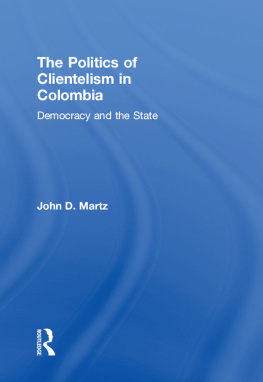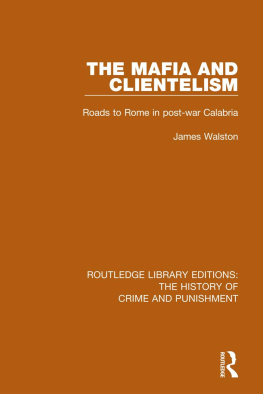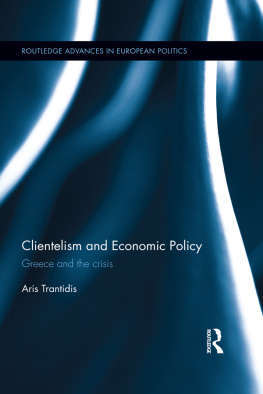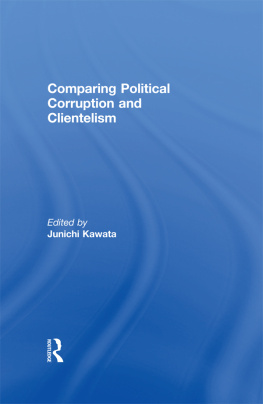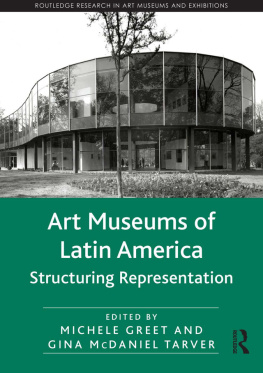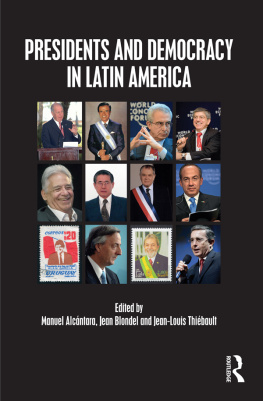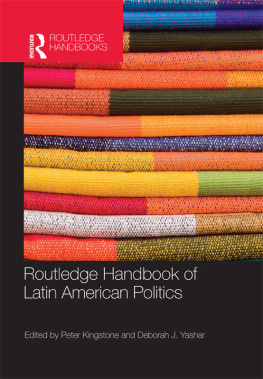First published 1997 by Transaction Publishers
Published 2017 by Routledge
2 Park Square, Milton Park, Abingdon, Oxon OX14 4RN
711 Third Avenue, New York, NY 10017, USA
Routledge is an imprint of the Taylor & Francis Group, an informa business
Copyright 1997 by Taylor & Francis.
All rights reserved. No part of this book may be reprinted or reproduced or utilised in any form or by any electronic, mechanical, or other means, now known or hereafter invented, including photocopying and recording, or in any information storage or retrieval system, without permission in writing from the publishers.
Notice:
Product or corporate names may be trademarks or registered trademarks, and are used only for identification and explanation without intent to infringe.
Library of Congress Catalog Number: 96-21482
Library of Congress Cataloging-in-Publication Data
Martz, John D.
The politics of clientelism : democracy and the state in Colombia / John D. Martz.
p. cm.
Includes bibliographical references and index.
ISBN 1-56000-264-6 (alk. paper)
1. Patronage, PoliticalColombia. 2. Patron and clientColombia. 3. ColombiaPolitics and government1946 . 4. DemocracyColombia. 5. State, The. I. Title.
JL2881.M37 1996
302.9861dc20
96-21482
CIP
ISBN 13: 978-1-56000-264-2 (hbk)
A young North American exchange student first set foot in Colombia during the penultimate year of the Rojas Pinilla dictatorship. If a some-what quixotic memory is not playing tricks on me, it was the eve of Bastille Day, no less. Consequently, even the least quantitatively oriented scholar will calculate that I have been observing and studying Colombian politics and society for four decades. Notwithstanding any possible protestations that I was uncommonly precocious when I first arrived in Colombia, my contemporaries today recognize me as a veteran of Latin American social studies who is literally as well as figuratively a graybeard. At the same time, the passing of years may well enhance ones intellectual experience while nourishing that historical perspective that the social sciences sometimes denigrate or forget in their search for empirical truths. In my own case, the early years led to a thesis on the Rojas dictatorship and then to the 1962 publication of Colombia: A Contemporary Political Survey (Chapel Hill: The University of North Carolina Press, 1962). The latter concentrated attention on the deterioration of elitist democracy and coalition government from the 1930s forward, punctuated by the rise of rural violence, the traumatizing bogotazo in 1948, and the breakdown of coalition governmental traditions that led to civilian authoritarianism under Laureano Gmez at the start of the 1950s. This culminated in military rule and the vicissitudes of General Gustavo Rojas Pinilla as he sought to build his own personalistic regime. His ultimate failure was chronicled, along with the introduction of the Frente Nacionalthe National Front system designed for biparty control of a renewed democracy, one in which traditional elites would reestablish their customary domination of Colombian life and society. The book was later translated and published in Bogot by the Universidad Nacional de Colombia (1969), and the original was republished by Greenwood Press in 1975. In the meantime, my own intellectual and regional research interests were relatively undisciplined. Thus, my publications touched on a rather broad variety of topics. That is irrelevant here, except to note that I maintained a keen interest and curiosity about the National Front, and hence the course of political events in Colombia. Occasional essays, reviews, and varied short pieces were forthcoming. With the gradual move away from the National Front, initially in constitutional terms but only more recently as a shift in political dynamics, my research activities responded in kind. This has led during the past dozen years or so to more concentrated attention on both single-country and comparative studies focusing on Colombia, Ecuador, and Venezuela. Visits to all three have been frequent, including extended stays in Colombia for teaching as well as research in both 1986 and 1992, along with the most recent in the summer of 1995.
Those published works of mine that are most relevant to this book are cited where appropriateselectively, not exhaustively. At the same time, I have been pursuing truly comparative work, and envisage extended work on the political parties of the three Grancolombian nations in the near future. Before any of this, however, came the realization that, as a Colombian student put it to me one evening after a seminar, it is time to go back and update your earlier book. I shrugged off the idea casually, but the thought lingered. The fact that anyone even remembered a book written so many years earlier was striking. Furthermore, in reexamining the book carefully and rethinking my early research career along with commitments and interests over more recent and current agendas for investigation, other ideas also began to take hold. It soon became obvious that the appropriate effort should be much more than updating. For that matter, how does one merely update some thirty years of politics? Absurd.
I leave to the Introduction a discussion of those theoretical and conceptual questions that have informed the book, as well as thematic political concerns that stand out during the decades of Colombian political experience which are the subject of the analytic narrative. They draw on the rich literature of political clientelismso much a part of the Colombian traditionas well as the more uncertain if currently thriving contemporary literature on democratization. In so doing, I acknowledge an extraordinary intellectual debt to a large and still growing contingent of Colombian and foreign social scientists. When I was first trying to untangle and understand the complexities of Colombian social and political life, the number of scholars similarly engaged was small. What a pleasure it is to survey the situation today.
Social science research in Colombia is not only alive and well, but represents some of the finest work anywhere in the western hemisphere. International cooperation and collaboration has also been extensive, thus rewarding a growing number of North Americans and Europeans. In Colombia and abroad, new contingents of talented graduate students are responding to quality education, and the results bode very well indeed for the future. It would otherwise be impossible to undertake a project as broad in scope as this book. For better or worse, I ultimately designed and structured a work that, if feasible by a foreigner, necessarily relies heavily on the investigations of many other scholars. The amount of literature that I have attempted to traverse is extensive and intensive, to understate the reality grossly. Others will have to judge the extent to which my undertaking has justified the effort.
Even granting the inevitably personal element that must accompany any modest effort to acknowledge ones intellectual and institutional debts, there are dangers of omission. With apologies in advance for those who I may be slighting, however, I cannot fail to extend special appreciation for some of those who were most generous of their time, energy, resources, andmost important of alltheir ideas. Many have been affiliated with one or another of the institutional bases from which I have taught and conducted research. In 1986 these included the Pontificia Universidad Javeriana and the Universidad de los Andes in Bogot, and also the Escuela Superior de Administracin Pblica. Lectures and conferences were conducted at the Universidad de Cartagena, the Universidad Tecnologa del Magdalena in Santa Marta, the Universidad del Norte in Barranquilla, and the Universidad de Antioquia in Medelln. Six years later my affiliation was exclusively with the Facultad de Estudios Interdisciplinarios at the Javeriana, along with several weeks at the Universidad Antnoma de Bucaramanga.

